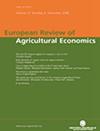Why did U.S. food retailers voluntarily pledge to go cage-free with eggs?
IF 3.5
2区 经济学
Q2 AGRICULTURAL ECONOMICS & POLICY
引用次数: 0
Abstract
I develop a model of provision competition between food retailers to examine one potential economic rationale behind voluntary cage-free egg pledges. I show that competition pushes retailers to a prisoners’ dilemma equilibrium where retailers incur fixed costs to offer both non-cage-free and cage-free eggs to steal or prevent the loss of some basket-shopping consumers. In a dynamic setting, retailers can potentially sustain an equilibrium of higher profits by collectively withholding non-cage-free eggs. I show that changing supply conditions and consumer trends could have led to such an equilibrium with pledges acting as a signal to potentially facilitate tacit coordination.为什么美国食品零售商自愿承诺不使用笼养鸡蛋?
我开发了一个食品零售商之间供应竞争的模型,以检验自愿非笼养鸡蛋承诺背后的潜在经济原理。我表明,竞争将零售商推向囚徒困境均衡,在这种均衡中,零售商需要承担固定成本,以提供非散养鸡蛋和散养鸡蛋,以偷窃或防止一些篮子购物消费者的流失。在动态环境中,零售商可以通过集体扣留非散养鸡蛋来维持更高利润的平衡。我指出,不断变化的供应条件和消费趋势可能导致这样一种平衡,承诺可以作为潜在地促进默契协调的信号。
本文章由计算机程序翻译,如有差异,请以英文原文为准。
求助全文
约1分钟内获得全文
求助全文
来源期刊

European Review of Agricultural Economics
管理科学-农业经济与政策
CiteScore
6.60
自引率
5.90%
发文量
25
审稿时长
>24 weeks
期刊介绍:
The European Review of Agricultural Economics serves as a forum for innovative theoretical and applied agricultural economics research.
The ERAE strives for balanced coverage of economic issues within the broad subject matter of agricultural and food production, consumption and trade, rural development, and resource use and conservation. Topics of specific interest include multiple roles of agriculture; trade and development; industrial organisation of the food sector; institutional dynamics; consumer behaviour; sustainable resource use; bioenergy; agricultural, agri-environmental and rural policy; specific European issues.
Methodological articles are welcome. All published papers are at least double peer reviewed and must show originality and innovation. The ERAE also publishes book reviews.
 求助内容:
求助内容: 应助结果提醒方式:
应助结果提醒方式:


